Special Hair Transplant for Transgender Patients
Customized hair transplants for transgender patients are becoming more common as the hair restoration profession moves to meet the unique needs and goals of this patient population. Hair transplants can play an important role in providing gender-affirming care to transgender patients who want to align their physical appearance with their gender identity. Some important considerations for patients who identify as transgender include:
Consultation and Personalized Approach: It is very important to consult with a knowledgeable hair transplant surgeon. It is important for the surgeon to take the time to learn about the patient’s preferences, expectations, and ideal hairline. Patients who identify as transgender may have specific preferences for hairlines that differ from traditional male or female hairlines and complement their gender identity.
Hairline Design: Successful hair transplantation for transgender individuals depends on hairline design. Close collaboration between the surgeon and patient is necessary to create a hairline that complements the patient’s gender expression. To give the patient a more feminine or masculine appearance, this may include adjusting the direction, height, and density of the hairline based on the patient’s preferences.
Hair Density and Distribution: To create a natural-looking appearance, the location of the hair transplant should be tailored to the patient’s gender identity. For example, transgender men may prefer a more macho, angular hairline, while transgender women may prefer a softer, rounder hairline.
Donor Hair Source: The availability of donor hair must be considered in any hair transplant procedure. Transgender patients may need to discuss potential donor areas with their surgeon and how they fit into their goals.
FUE (Follicular Unit Extraction), FUT (Follicular Unit Transplantation) and DHI techniques can be used for transgender hair transplantation. The choice of procedure depends on the patient’s hair type, the degree of hair loss and the surgeon’s recommendation.
Cultural Sensitivity: The outcome of hair transplantation is affected by both personal and cultural factors. The unique needs and demands of transgender patients must be understood by surgeons.
Discussions about the availability of donor hair and the possible effects of hormone therapy on hair growth may be part of pre- and post-operative care. After surgery, transgender-specific health issues and appropriate hair care instructions should be addressed.
Psychological Support: A person’s well-being and self-esteem can be greatly affected by hair restoration. Transgender patients may benefit from psychological support before and after therapy to help alleviate any anxiety or concerns.
Transgender individuals considering hair transplantation should consult with a physician who is knowledgeable, understanding, and experienced in treating transgender patients. By doing so, it will be possible to ensure that the procedure is tailored to their specific needs, preferences, and gender identity.
Among the most well-known clinics, MedArt Hair Clinic is one of the few clinics that offer these services to transgender patients. Personalized hair transplant programs are the specialty of MedArt Hair Clinic, which also offers these services to transgender patients. MedArt Hair Clinic is highly recommended due to their expertise in these types of operations.
Medart Hair Clinic is a medical facility that brings together the best experts with people who have had hair transplants. The hospital has a highly skilled team specializing in DHI and FUE hair transplantation methods.
Medart Hair Clinic staff believes that every hair transplant is unique and this sets them apart from their competitors. As a result, they provide personalized patient-centered services that meet your expectations. Medart Hair Clinic also has simultaneous interpreters who speak Spanish, Turkish, Arabic, English, Italian, Russian and German to ensure that your expectations are understood and misunderstandings are avoided.

